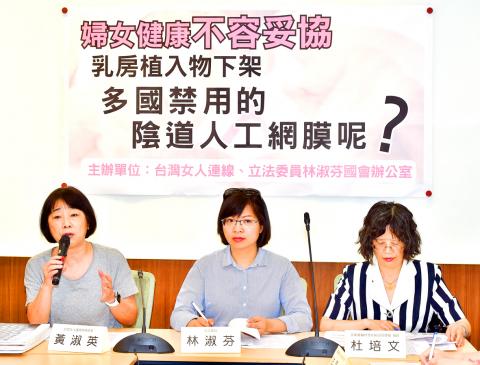Democratic Progressive Party Legislator Lin Shu-fen (林淑芬) and Women’s Link founder Huang Sue-ying (黃淑英) yesterday called on the government to ban transvaginal mesh implants and establish a registry system for medical implants.
Transvaginal mesh implants are used to repair weakened or damaged tissue in women’s bladder or pelvic areas, usually in cases of pelvic organ prolapse (POP) or stress urinary incontinence (SUI).
The US Food and Drug Administration (FDA) cleared the first surgical mesh product specifically for use in SUI cases in 1996 and for POP cases in 2002.

Photo: Tu Chien-jung, Taipei Times
However, complications including chronic pain, vaginal bleeding or discharge, pain during intercourse, urinary problems and exposure of the mesh through the vagina have been reported in many nations, triggering lawsuits in several countries.
New Zealand and Australia last year banned the use of the implants, while the UK enacted a temporary ban, and in April, the FDA ordered manufacturers to immediately stop selling and distributing surgical mesh for anterior compartment prolapse repair, citing safety concerns, Huang told a news conference at the Legislative Yuan in Taipei.
“Compared with the proactive measures taken in other nations, Taiwan is still silent on the issue,” she said.
The Ministry of Health and Welfare only changed the classification of transvaginal mesh to a third-class “high-risk” medical device in July 2017, requiring manufacturers to submit a safety report on their products every six months, Huang said.
“The government is very irresponsible. Its relaxed attitude toward regulating the manufacturers, neglecting the health risks to women who have had such implant surgery,” Lin said.
Reports of complications associated with transvaginal meshes in Taiwan increased from 59 cases in 2013 to 303 cases in 2017, and some patients might not even be aware that their discomfort could be the result of complications caused by the implants, she said.
The government needs to establish a medical implant registry system, and require that patients be informed about the possible risks associated with transvaginal meshes before having such surgeries.
Food and Drug Administration section chief Tu Pei-weng (杜培文) said the agency was aware of international safety warnings about the products and had adjusted the risk management measures on such implants.
However, a meeting of specialists that the agency held in March suggested that the reported problems in Taiwan stemming from such procedures were more due to physicians’ training and patient screening than with the products, she said.
The specialists at the meeting said that banning the use of transvaginal mesh implants would hurt women with SUI or POP, as there is no better alternative treatment, Tu said.
Given patient personal data protection regulations, registry systems are usually voluntary, not compulsory, she said.
An amendment to the Regulations for Governing the Management of Medical Devices (醫療器材管理法) that is under review at the Legislative Yuan would require the tracking of high-risk medical devices from the manufacturers, Taiwan’s Food and Drug Administration said.

ANOTHER EMERGES: The CWA yesterday said this year’s fourth storm of the typhoon season had formed in the South China Sea, but was not expected to affect Taiwan Tropical Storm Gaemi has intensified slightly as it heads toward Taiwan, where it is expected to affect the country in the coming days, the Central Weather Administration (CWA) said yesterday. As of 8am yesterday, the 120km-radius storm was 800km southeast of Oluanpi (鵝鑾鼻), Taiwan’s southernmost tip, moving at 9kph northwest, the agency said. A sea warning for Gaemi could be issued tonight at the earliest, it said, adding that the storm is projected to be closest to Taiwan on Wednesday or Thursday. Gaemi’s potential effect on Taiwan remains unclear, as that would depend on its direction, radius and intensity, forecasters said. Former Weather Forecast

As COVID-19 cases in Japan have been increasing for 10 consecutive weeks, people should get vaccinated before visiting the nation, the Centers for Disease Control (CDC) said. The centers reported 773 hospitalizations and 124 deaths related to COVID-19 in Taiwan last week. CDC Epidemic Intelligence Center Director Guo Hung-wei (郭宏偉) on Tuesday said the number of weekly COVID-19 cases reported in Japan has been increasing since mid-May and surpassed 55,000 cases from July 8 to July 14. The average number of COVID-19 patients at Japan’s healthcare facilities that week was also 1.39 times that of the week before and KP.3 is the dominant

The Chinese Communist Party’s (CCP) working group for Taiwan-related policies is likely to be upgraded to a committee-level body, a report commissioned by the Mainland Affairs Council (MAC) said. As Chinese President Xi Jinping (習近平) is increasingly likely to upgrade the CCP’s Central Leading Group for Taiwan Affairs, Taiwanese authorities should prepare by researching Xi and the CCP, the report said. At the third plenary session of the 20th Central Committee of the CCP, which ended on Thursday last week, the party set a target of 2029 for the completion of some tasks, meaning that Xi is likely preparing to

US-CHINA TRADE DISPUTE: Despite Beijing’s offer of preferential treatment, the lure of China has dimmed as Taiwanese and international investors move out Japan and the US have become the favored destinations for Taiwanese graduates as China’s attraction has waned over the years, the Ministry of Labor said. According to the ministry’s latest income and employment advisory published this month, 3,215 Taiwanese university graduates from the class of 2020 went to Japan, surpassing for the first time the 2,881 graduates who went to China. A total of 2,300 graduates from the class of 2021 went to the US, compared with the 2,262 who went to China, the document showed. The trend continued for the class of 2023, of whom 1,460 went to Japan, 1,334 went to